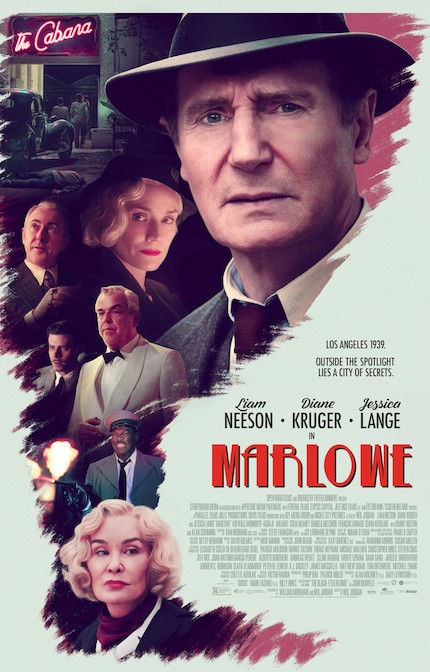MARLOWE Review: Over-Familiar Tropes Sinks Chandler Homage
Directed by Neil Jordan, Liam Neeson, Diane Kruger and Jessica Lange star in an adaptation of a novel by John Banville.

With recognizable names like Liam Neeson, Diane Kruger, Jessica Lange, Alan Cumming, and Danny Huston in front of the camera and acclaimed writer-director Neil Jordan (The End of the Affair, The Butcher Boy, The Crying Game) behind the camera, Marlowe, an adaptation of The Black-Eyed Blonde, Brit novelist John Banville’s 2014 homage to Raymond Chandler’s working-class private detective, seems all but guaranteed to deliver an accomplished, A-level effort in neo-noir aesthetics and thematics.
Alas, Marlowe is everything but accomplished, though it’s certainly not for the lack of trying by everyone involved. Almost nothing works here, though, from Neeson’s gruff, despondent, world-weary portrayal of the title character, to a supporting cast that’s unsure of what film they’re in, and finally to an overly convoluted, over-complicated plot that simultaneously leads nowhere and everywhere all at once.
In the 70-year-old Neeson, however, Jordan found a near-perfect representation of Chandler’s private sleuth. With its ancient crags, peaks, and ridges, Neeson has a face meant for the cynical, pessimistic, downbeat world of interwar noir.
Despite the 1930s setting, Neeson’s slow, ambling walk and even slower speech patterns align with a Marlowe apparently closer to the end of his career as a detective than the beginning or even the middle. Neeson's Marlowe has been there, seen that, done everything, and has all but lost his faith in humanity, all for good reason.
Everyone he’s encountered across multiple iterations seems to fall into two camps: the duplicitous or the soon-to-be-duplicitous. Trusting no one and living alone seems to be less out of cynicism than an expression of a time-tested survival instinct.
Like practically every past Marlowe on film, Neeson and Jordan’s interpretation of the character starts in a moment of temporary stasis or suspended animation, waiting for his next case to walk into the office of his private detective agency. That she’s another in a long, seemingly endless series of potentially double-dealing, sultry blondes, Clare Cavendish (Diane Kruger), doesn’t faze an otherwise skeptical Marlowe.
He can barely raise an eyebrow to express even minimal engagement with Clare's dubious story about a missing lover, Nico (Francios Arnaud), and her desperate need to reunite with him again, presumably out of romantic attachment if not outright love. Any other private eye might ask for additional, corroborating details, maybe even some background info on Nico, but this version of Marlowe simply shrugs his shoulders and accepts the case.
After all, Marlowe has an open slot in his schedule and bills (e.g., food, rent and so forth) to pay, so he does what he does best and starts digging into the case with all the urgency of a building contractor padding out an invoice with "unexpected" costs. Almost immediately, though, the case seems to resolve itself, but following the template laid out by Chandler almost a century ago, no case is as simple or straightforward as it appears, not when everyone even tangentially involved -- including, of course, Clare, her mother, Dorothy (Jessica Lange), an ex-movie star, Lou Hendricks (Alan Cumming), a colorfully verbose, hyperactive gangster, and Floyd Hanson (Danny Huston), a volatile country club owner and potential string-puller -- has a conflicting agenda of his or her own.
For all of its plot gyrations, character reveals, and periodic outbursts of violence, Marlowe slips into banality and tedium on more than one occasion. Unlike the Chandler original, Neeson’s Marlowe rarely hesitates to use his fists when a clever quip would do.
He’s far less cerebral or verbose than Chandler’s character or his earlier, mid-century incarnations onscreen (Humphrey Bogart, Dick Powell, Robert Montgomery) or even the latter, revisionist ones (James Garner, Elliott Gould). That might work as a valid 21st-century interpretation of a century-old character, but here it feels like Jordan, desperately hoping to keep audiences engaged in otherwise underwhelming, greatest-hits material, with randomly added dollops of violence.
Jordan also made the call to throw a yellow filter over the visuals, supposedly to invoke a sheen of physical ugliness to match the moral turpitude of a fallen, corrupt Los Angeles. On the plus side, Jordan relied on European locations, specifically Dublin and Barcelona, to sub credibly for 1940s-era Los Angeles. It’s a pity then that the visuals, as well as Neeson’s performance, serve little function than to remind viewers that other, better interpretations of Chandler’s Marlowe are a streaming service away.
Marlowe is now playing in select movie theaters.
Marlowe
Director(s)
- Neil Jordan
Writer(s)
- William Monahan
- John Banville
- Raymond Chandler
Cast
- Liam Neeson
- Diane Kruger
- Jessica Lange







